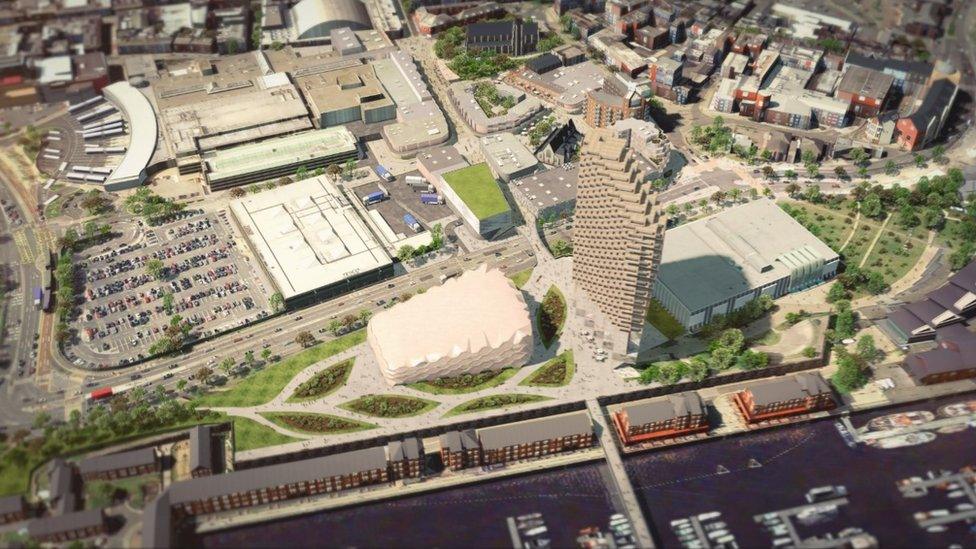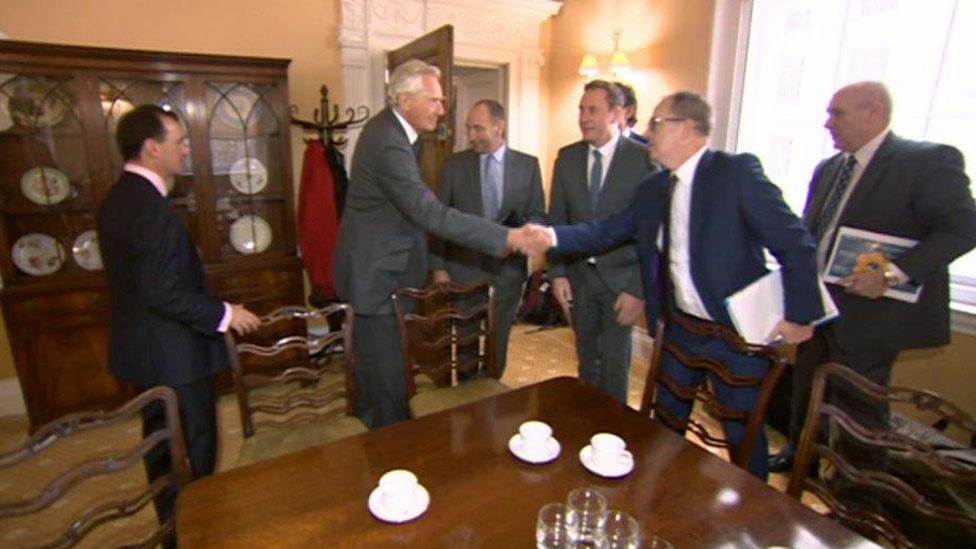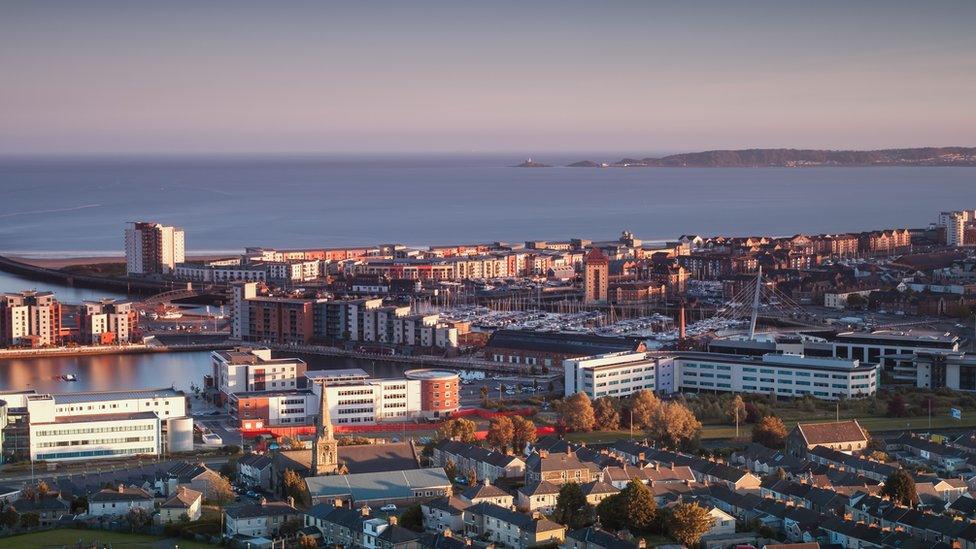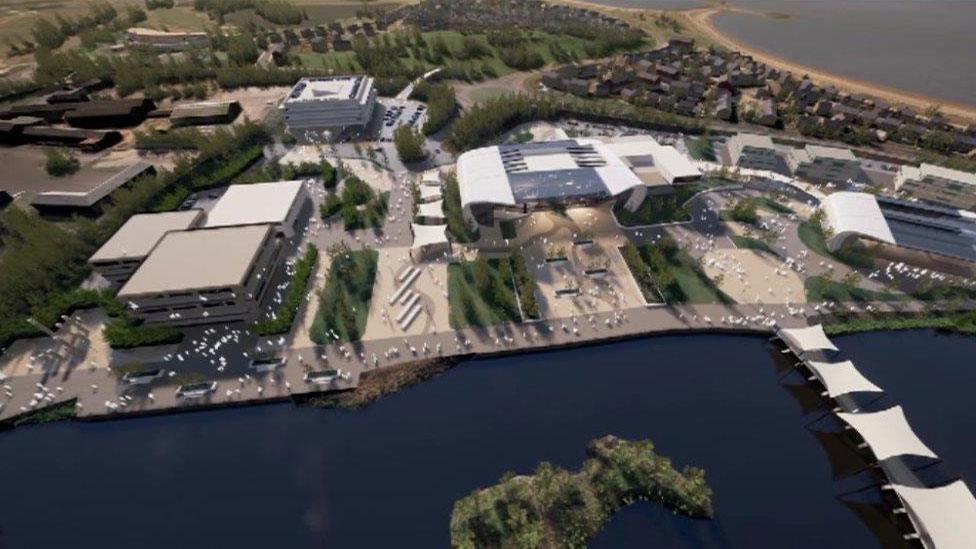Swansea Bay's £1.3bn city deal 'ready to sign'
- Published

Swansea council's leader is confident a £1.3bn city deal is ready to sign off with the UK government.
Councillor Rob Stewart believed they "could not be in a better position" to agree the deal which could be worth millions over the next 15 years.
But a transatlantic cable, described as a "game changer" in bringing ultrafast broadband to the Swansea Bay region, is not part of the deal.
It would be separate but complementary, said Mr Stewart.
But the Gower MP Byron Davies has called the Swansea City deal a "muddle" that needs "sorting out".
Swansea Bay City Region's chairman Sir Terry Matthews, interviewed a year ago, had described the importance of the communication channel from New York to London via the south west Wales region.
He added at the time that the cable would make the Swansea Bay City Deal, unlike those put forward by other areas, deliver for the whole of the UK rather than the region alone.
But Mr Stewart said the Project Jupiter cable was a separate project - and like Tidal Lagoon's relationship with the city deal's energy projects - would be "aligned" and "complementary" rather than directly part of the city deal.
BBC Wales has seen a copy of the latest plan put to the UK government.
What is on the table involves 11 different projects. These range from investments of £50m in the Swansea City and Waterfront Digital District and £5m for the Yr Egin creative hub project in Carmarthen, that includes a new headquarters for broadcaster S4C.
Mr Stewart denied that the focus on buildings could lead to a return of the failed Technium project.
He added that the Swansea Techniums had been a success story.
The city deal aims to support "next generation industries" and to apply internet technologies for the region's energy sector.
Council leader Rob Stewart said there had been "substantial" support from private business
It also aims for the four council areas stretching from Neath Port Talbot to Pembrokeshire to become a magnet for hi-tech and cloud data firms.
Life science firms would work alongside local hospitals, including an eye-catching £225m "wellness village" planned for near Llanelli.
But Mr Stewart strongly denied the focus had shifted away from the "internet coast" vision to a more traditional focus of bricks and mortar developments.
"In order to deliver the sorts of economic change we want in this region we have to take forward the fifth generation technologies - the establishment of the test bed," he said.
"We've been very clear about that and Sir Terry Matthews and his business partner from Wesley Clover, Simon Gibson, have been integral in bringing that together.
"They can demonstrate though the model they've successfully rolled out in Canada, they've created 22,000 jobs there and we believe we can make that sort of economic impact here.
"Whilst there are several projects which will have construction as part of it, the real golden thread through the deal are still those new technologies and new industries."

Lord Heseltine meeting the Swansea Bay city region team
City deals exist to give financial support for councils to work more regionally on big projects - which will stimulate private investment and have a real transformational impact.
There are hopes the Swansea Bay deal could be mentioned in Wednesday's Budget from Chancellor Philip Hammond.
Mr Stewart said very positive meetings had been held with the Welsh Secretary Alun Cairns and Swansea-born Lord Heseltine, adviser to the communities and local government secretary.
"As far as we're concerned we've answered all the questions posed to us by Treasury officials and others and feel we're at the point when we're ready to sign," Mr Stewart told BBC Wales.
UK government sources have played down hopes that the deal could be given the formal go-ahead in the Budget.
Last week, Mr Hammond said the discussion was still ongoing and he hoped for a conclusion within days.
But the Gower MP Byron Davies said: "It is a muddle at the moment and needs sorting out. It lacks an overall strategy.
"It has been too local authority-orientated and it should have had some private sector involvement."
In response to the claims of the council leader, Mr Davies said: "I think he is pre-empting it.
"Before he says that it is ready to be signed off, he needs to be certain than things have been agreed and that it can be delivered.
"At the moment it is not."
'Vote of confidence'
Mr Stewart said £673m of private investment was ready to come into the region and the bid had "substantial support" from a wide range from within the private sector.
"It's still a unique deal and still a very class-leading deal in terms of what it tries to do," said Mr Stewart.
"Some of the comments back from the secretary of state and others is that it's a very innovative deal, it does lots of things individually that others are doing but nobody is doing those in the way we are putting this together.
"The biggest vote of confidence is if you look at the UK's industrial strategy, recently released by Theresa May, you map that against what our city deal is doing and the two are indivisible. People have caught up with the thinking that our city deal provides."
- Published7 March 2017

- Published28 January 2017

- Published8 February 2017

- Published19 January 2017

- Published24 February 2016
